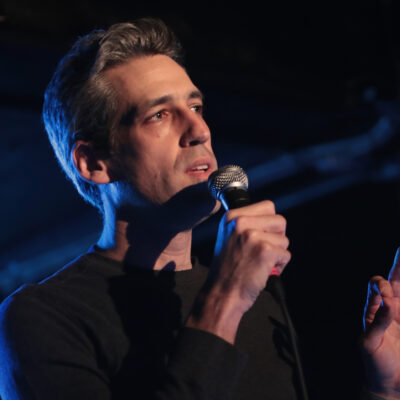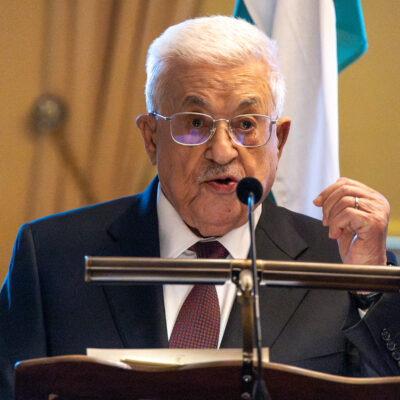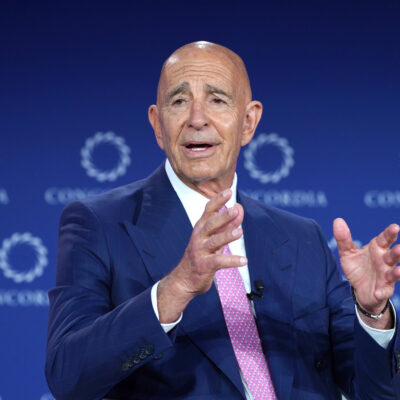
Kayla Bartkowski/Getty Images
Bill Cassidy leans in to fight antisemitism as chair of key Senate committee
The Louisiana Republican is now focused on passing the Antisemitism Awareness Act, a key priority for the organized Jewish community
Sen. Bill Cassidy (R-LA), the chairman of the Senate Health, Education, Labor and Pensions (HELP) Committee, will bring up the Antisemitism Awareness Act and another piece of antisemitism legislation for consideration on Wednesday — the latest in a series of steps Cassidy has taken to respond to campus antisemitism since the Oct. 7, 2023, Hamas attacks in Israel and the ensuing war in Gaza.
The Louisiana senator has made antisemitism a major focus for the HELP Committee this Congress, something he vowed to do last year if Republicans retook the Senate as he pushed Democrats to take action on the issue. Starting one month after the Oct. 7 attacks, Cassidy began pushing for the committee to hold a hearing on the surge in campus antisemitism, ultimately convening a bipartisan roundtable on the subject that month after then-committee chairman Sen. Bernie Sanders (I-VT) wouldn’t allow for a full committee hearing.
Cassidy has leaned in since taking over the chairmanship role from Sanders in January, signing on as a cosponsor of the Antisemitism Awareness Act, reintroducing his Protecting Students on Campus Act with Sen. John Fetterman (D-PA) — which will also be marked up on Wednesday — holding the panel’s first hearing on domestic antisemitism since Oct. 7 and launching an investigation into Americans Muslims for Palestine’s activities on college campuses.
The HELP Committee markup will mark the first major action in the Senate on AAA since the Oct. 7 attacks.
“Jewish students and their families are depending on strong leadership to protect their civil rights. The Trump administration has made significant progress. Now is the time for Congress to do its part to ensure Jewish students are safe on campus. Today’s markup is Congress doing its part,” Cassidy will say in his opening remarks at the markup.
AAA has been a priority for the Jewish community for years and for Cassidy, who told Jewish Insider in an interview this week that he expects both pieces of legislation to advance out of committee. Cassidy says he wants to see the response from universities once the two bills become law, but is open to considering further legislative efforts if needed down the line.
“I think we have to see how this plays, because, obviously, there’s executive orders, obviously there’s a greater sense of awareness among college and university presidents that they are being scrutinized because of this,” Cassidy said of next steps for Congress in finding policy avenues to address domestic antisemitism.
Asked about the HELP antisemitism hearing, which came a year and a half after his initial request to convene a full committee hearing on the issue of campus antisemitism, Cassidy replied, “Jewish leaders, whether they’re in Louisiana or out of Louisiana, were glad to have been heard. They were glad for the platform. The time for inaction is over, and they feel like there has been officially sanctioned inaction. Some folks who have been working on some of these issues for literally decades feel like now the time has come.”
“His leadership has been extraordinary on this issue. Last year, before he became chairman, he asked Chairman Sanders to hold a hearing on antisemitism on college campuses and Bernie refused, so he did a roundtable that was incredibly compelling. So I think he’s been one of the foremost leaders on this issue, and I really commend him for it. He’s brought a lot of attention to the issue that was long overdue,” Sen. Susan Collins (R-ME), who serves with Cassidy on the HELP Committee, told JI.
Cassidy also praised the Jewish students who have spoken publicly about their experiences.
“I think some of the best advocates have been Jewish students who have come to speak about their experience. Not people who are shrinking violets — to use the kind of term of the day, snowflakes — but people who truly felt a sense of physical threat. They’ve been the best advocates. Addressing hate should not be partisan, it should be something that we all go after and make it so that if that child were my child, my child would not have that same sense of oppression,” Cassidy said.
The heavy focus on the issue has won him plaudits from colleagues on both sides of the aisle.
“I think he is someone with deeply held convictions, who is willing to face criticism in order to put forward what he believes. He’s a man of great integrity,” Sen. John Hickenlooper (D-CO), who also serves on the HELP committee and is a fellow cosponsor of AAA, said of the Louisiana senator.
“His leadership has been extraordinary on this issue. Last year, before he became chairman, he asked Chairman Sanders to hold a hearing on antisemitism on college campuses and Bernie refused, so he did a roundtable that was incredibly compelling. So I think he’s been one of the foremost leaders on this issue, and I really commend him for it. He’s brought a lot of attention to the issue that was long overdue,” Sen. Susan Collins (R-ME), who serves with Cassidy on the HELP Committee, told JI.
Fetterman said he has found Cassidy “to be an absolutely great partner for combating antisemitism. We both really agree that it’s a scourge here in our country, and it’s entirely appropriate to address this through legislation.”
“I think he is someone with deeply held convictions, who is willing to face criticism in order to put forward what he believes. He’s a man of great integrity. I don’t want to get him in trouble, because it probably would help him if I said he’s kind of a scumbag, but I wouldn’t say that. I have a lot of respect for him,” Sen. John Hickenlooper (D-CO), who also serves on the HELP committee and is a fellow cosponsor of AAA, said of the Louisiana senator.
The Louisiana Republican has faced criticism from his right, including being censured by his state’s party for his vote to convict President Donald Trump in his 2021 Senate impeachment trial following the Jan. 6 Capitol riot. Cassidy, a gastroenterologist, also faced significant pressure from MAGA activists to support the confirmation of Robert F. Kennedy, Jr. as health and human services secretary despite expressing public concerns about Kennedy’s skepticism of vaccines.
Up for reelection in 2026, Cassidy is facing a primary challenge from Louisiana state Treasurer John Fleming, who served in the House of Representatives from 2008-2016. Fleming has said he believes Cassidy is vulnerable because of his vote to impeach Trump and his refusal to endorse the president’s 2024 bid, even after Trump won the GOP nomination. Louisiana state Sen. Blake Miguez, a Republican, is also considering throwing his hat in the ring.
(For his part, Cassidy has said he intends to seek reelection, but has not yet made a formal announcement launching his campaign.)
“Anyone in the United States that doesn’t feel some sort of cultural kinship with Israel and with our Jewish community, I kind of almost feel like you haven’t grown up in the United States, at least not in my United States,” Cassidy said.
Despite the small Jewish constituency in Louisiana — there are only about 20,000 Jews in the state, mostly in the New Orleans area — Cassidy has been on the forefront of the effort to address antisemitism in the Senate.
Cassidy, who began his political career as a state senator, entered public office in 2006, after seeing how the response to Hurricane Katrina had caused a breakdown in the state’s healthcare system. He was elected to the Senate in 2014 after one term in the state Senate and three terms in the House of Representatives. Since taking over the HELP Committee this year, Cassidy has prioritized supporting students with reading disabilities, an issue he took up after his daughter Kate’s dyslexia diagnosis at age seven.
As for what has compelled him to take a leadership role in pushing the Senate to take action on domestic antisemitism, Cassidy pointed to his longstanding connection to the Jewish community.
“Anyone in the United States that doesn’t feel some sort of cultural kinship with Israel and with our Jewish community, I kind of almost feel like you haven’t grown up in the United States, at least not in my United States,” Cassidy said, adding that he felt a “sense of outrage” watching colleges and universities tolerate the harassment of Jewish students on their campuses when the United States “went through a long battle over civil rights about this.”
“It’s pretty compelling when kids are chased into a room and there’s people pounding on the door, or those who hate Israel are locking up janitors and physically threatening them. That’s not free speech, that’s bigotry. You put that all together and it gives you an incredible sense of motivation,” he continued.
Jewish Insider’s senior congressional correspondent Marc Rod contributed to this report.
Please log in if you already have a subscription, or subscribe to access the latest updates.






